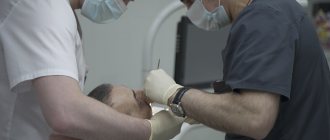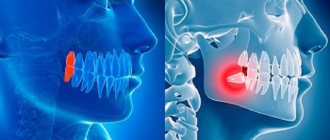Some people are only slightly nervous and experience slight discomfort before going to the dentist, while for others, just the thought of a dentist and dental instruments causes panic. Although in the modern world dentistry has long been absolutely safe and painless. In the latter case, we can talk about the development of dental phobia, as a result of which fear becomes irrational and uncontrollable. To understand how not to be afraid of the dentist, you first need to understand the reasons for this fear.
Where does fear of the dentist come from?
Each person's fear of dentists has its own reason, but the factors contributing to its occurrence are quite similar.
The oral cavity is one of the most sensitive areas in the body. Therefore, any medical procedures associated with the slightest intervention in this area cause a feeling of anxiety. And the person in the dental chair has a feeling of helplessness, giving rise to fear.
For many people, the fear of the dentist goes back to childhood. Memories associated with the dental office of the last century most often include a feeling of pain, inconvenience, resentment at the dentist’s harshness, and a nasty smell and taste. All this could not but lead to the emergence of a fear of the dentist, and subsequently to the development of a phobia.
Sometimes people are afraid of the dentist's reaction to the terrible condition of their teeth. Unfortunately, this fear is provoked by dentists who reprimand their patients too harshly for neglecting their health.
And the fear of visiting the dentist in children is often a reflection of the phobia of their parents. The child sees and feels how adults are afraid of the dentist, and he also becomes very scared.
Removal process
Since almost all dental procedures are now carried out using modern painkillers, the patient usually does not feel any discomfort, even during tooth extraction - the doctor can press on the molar, pull it out of the socket, and separate the roots. Of course, without anesthesia, pulling out teeth would be much more painful, if not completely impossible, so you should not be afraid of the procedure.
During the extraction, some people experience weakness, slight dizziness and malaise, which disappear after the removal and freezing are completed. The algorithm for removing a molar is as follows:
- expansion of the tooth socket in order to relax the compressed bone tissue (done by loosening the molar with special pressure);
- separation of the tooth from the ligaments with which it is attached to the socket;
- extraction of the molar from the causative site;
- applying a gauze pad.
Usually, if the actions are performed correctly, the tooth is extracted without difficulty; a problem can arise if the molar is too firmly secured or the structure of the roots is too complex. Then the dentist has to divide the root into parts and extract them one by one.
The pain begins to be felt after the tooth has been pulled out and the anesthetic has worn off, so you should not be afraid
The most impressionable patients experience panic at the moment the molar becomes loose, thinking that the doctor is even destroying the bone tissue of the jaws. The dentist can indeed press hard on the tooth, but the feeling of discomfort will not last longer than 2-3 minutes. Also, psychological comfort may be absent when removing wisdom teeth that are overgrown with gum - the doctor will first have to open the soft tissues, free and pull out the impacted molar, and after extraction, sew up the gum.
Why is it dangerous to be afraid to treat and remove teeth?
Some people, not knowing how to overcome their fear of the dentist, prefer to endure toothache until the last moment, and go to the doctor only if it becomes unbearable. However, there are situations when such behavior becomes truly dangerous, especially if the pain is caused by the onset of some kind of inflammatory process.
So, with acute pulpitis or periodontitis, an infectious disease such as phlegmon can develop. This pathology poses a danger not only to human health, but also to his life.
Various infectious processes in the oral cavity can lead to inflammation of the lymph nodes - lymphadenitis, which, if left untreated, often leads to serious complications.
The presence of advanced caries, infection, periodontal disease and dental trauma often leads to abscesses, the main treatment for which is surgery. Without medical intervention, the disease is fatal.
In addition, caries slowly but surely destroys dental tissue, and if it is not treated, over time there will be no chance to save the tooth.
Therefore, for people who have no idea how to overcome their fear of the dentist, despite severe pain, it will be enough to simply assess the consequences of postponing a trip to the dentist.
Myth No. 2. As long as the wisdom tooth does not hurt, there is no need to remove it
It is worth clarifying here that indeed, not every wisdom tooth can be removed. There are clinical cases in which the third molars occupy the correct position in the oral cavity, effectively participate in the chewing process, and do not create problems for other teeth. Unfortunately, this is very rare.
In this article we are talking about those teeth that have already been recommended for removal by your dentist. And in this case, it is extremely undesirable to postpone going to the surgeon. I'll explain why.
A tooth located outside the dental arch (dystopic), impacted or semi-impacted (partially erupted tooth) is an area difficult to reach for cleaning. Over time, due to the accumulation of plaque, such a tooth will be destroyed, which will result in the development of an inflammatory process in the surrounding soft tissues and jaw bone. In other words, at the moment when you already feel anxiety in the tooth area, this will mean that the process of destruction has been going on for a long time. First of all, this is bad for the patient. Since the surgeon will cope with the emerging pathological process at this stage, however, you will have a longer treatment and rehabilitation period. It is possible that in a particularly advanced case, medical care will have to be received in a hospital setting at a maxillofacial surgery clinic. That is, it turns out that when treated as planned, the tooth can be removed at a time convenient for you, while maintaining good health and performance. If an inflammatory disease of the soft tissues (abscess or phlegmon) or jaw (periostitis or osteomyelitis) develops, the cause of which is a tooth that was not removed in time, you will have to stay in the hospital and undergo complex treatment.
I talked about the most dangerous scenario, since, in my opinion, the patient must have complete information in order to be able to make an informed and informed choice.
There are also less life-threatening, but no less unpleasant consequences of untimely removal of wisdom teeth.
The wisdom tooth can serve as a point to trap plaque and food debris. Thus, it will provoke the development of caries on neighboring teeth. In addition, the eruption of a wisdom tooth in the wrong position in the dentition can put pressure on adjacent teeth and change their position. As a result, problems with the bite and the condition of the temporomandibular joint will arise. At this stage, in addition to the removal of the wisdom tooth, it will be necessary to undergo treatment with an orthodontist, the goal of which will be to return the correct bite.
To summarize, I offer a number of recommendations, if followed, you will be able to solve the problem of wisdom tooth removal in a timely manner, without fear, health problems, unnecessary time and financial costs.
- If you do not know whether it is necessary for you to have your wisdom teeth removed, then be sure to ask your dentist this question at your next preventive examination.
- If your doctor has previously recommended that you have your wisdom tooth removed, do not delay your visit to a dental surgeon. If you are afraid to go straight for removal, then sign up for a consultation first. You will meet the doctor, ask all your questions, and plan the time to perform the surgical procedure. In the future, going to an appointment with a doctor you already know will be much calmer and more pleasant.
Tips on how to overcome your fear of dental treatment
How not to be afraid of the dentist? This question is asked by any person suffering from dental phobia, and the following tips can help him:
- In order not to be so afraid of the dentist, you can first make an appointment with him for a preliminary consultation. Nothing terrible will happen during it, and the patient will have the opportunity to get to know the attending physician, ask him all the necessary questions and, possibly, establish a trusting relationship with the dentist. In this case, it will be easier for the person to relax in the dentist's chair, and he will not be so afraid.
- Before the preliminary consultation, you should independently understand your fears so as not to forget to ask the doctor the most pressing questions. For example, if a person constantly thinks: “I’m afraid to have a tooth removed because the last time it was very painful,” it is precisely about the specifics of this procedure that you need to talk to the dentist about.
- You need to agree with your doctor that he will immediately stop the procedure if it suddenly becomes painful. Such a promise will help the patient gain confidence and peace of mind.
- If before any dental procedure the patient asks to be given anesthesia, his anxiety will immediately decrease.
- When choosing a dental clinic, it is better to give preference to one that is more like a sanatorium than a hospital, which causes unpleasant associations.
- In addition, a person who does not understand how to stop being afraid of the dentist will greatly benefit from the support of loved ones.
What does the sensation of pain depend on?
How painful it is to pull teeth, according to research, depends on several factors. In the same patient, the intensity of pain during extraction may vary depending on the following signs:
- a molar or baby tooth needs to be pulled out - removal of a baby molar is almost painless, since it does not have powerful long roots, like those of a permanent one;
- location on the jaw arch - frontal molars are removed with a feeling of much less intense pain, since they are smaller in size, their root system is not as developed as that of the lateral teeth. The same can be said about trauma to the surrounding soft tissues - they suffer less, especially in comparison with wisdom tooth extraction;
- tooth shape and number of roots - by nature, human molars can have 1-2 or 3-4 branches of a stabilizing root system. So, tooth extraction will be more uncomfortable the more root branches the molar has.
It is necessary to clarify that whether it is painful to pull out a tooth depends not only on the listed factors, but also on the perception of the procedure by the person himself. If you experience a feeling of panic and intense fear before the extraction, this psychological state can directly affect the procedure and actually provoke intense pain. There are many stories among patients not only about how much pain is felt during extraction, but also that there is a big difference whether a molar is removed from above or below, supposedly this affects the intensity of the discomfort.
We need to figure out whether these rumors have a scientific basis. Dentists claim that, regardless of the location of the tooth, it can be removed completely painlessly if high-quality anesthesia is administered, but the jaw may begin to hurt after the end of the freezing period. The severity of the pain syndrome will depend on several points:
- how much bone and soft tissue was destroyed;
- is there an acute inflammatory process at the time of removal;
- a frontal or lateral tooth is subjected to extraction;
- the lower or upper molar is removed;
- whether there is an accumulation of pus in the area of the unit being removed.
According to medical statistics, the removal of the upper incisors is less painful, since their root system is not as powerful and tortuous as that of the lower teeth.
The fact that lower units are more difficult to remove from the bed is also due to the density of the bone tissue. All these factors directly affect the degree of destruction and recovery time after the molar has been removed. Therefore, it makes no sense to say that it is painful to remove the lower teeth, but not the upper ones; the location will only affect the adaptation period after extraction.
What to do if advice doesn’t help
If a person who has taken advantage of the proposed advice declares: “I’m still afraid to treat my teeth - what should I do,” then he can try to overcome his fear by resorting to sedation or general anesthesia.
The use of general anesthesia in dentistry is an alternative replacement for local anesthesia and is often used in the treatment of patients suffering from dental phobia. Such anesthesia implies a complete shutdown of consciousness and an absolute loss of sensitivity.
Xenon sedation is a cross between anesthesia and anesthesia, but in a state of medicated sleep the patient responds to the doctor’s verbal commands, for example, to a request to open his mouth. It should be noted that after sedation it is much easier for the patient to recover than after general anesthesia.
Of course, a person who previously had no idea how to overcome his fear of the dentist will not be able to completely get rid of it before his first visit to the doctor. But over time, the fear will definitely pass.
Getting rid of panic fear
It sounds fantastic, but here are a few facts that will help you sober up and at least in theory understand that tooth extraction is not a terrible procedure at all:
- Tooth extraction is a long and very painful operation. This stereotype. Today, removal takes just 15-20 minutes. Conventional anesthesia is used, which is commonly called “freezing”. The patient does not feel anything (absolutely anything) - there is only an unpleasant sensation that the doctor is “fidgeting” in the jaw, but there will be no pain. There is, of course, a chance that the anesthesia will not work on you - but if you have successfully treated your teeth before, you don’t have to worry about it,
- anesthesia is really enough for the entire period; today local anesthesia is used even when installing implants - artificial analogues of tooth roots,
- the likelihood that complications will begin after tooth extraction is less than 5%,
- If a diseased tooth is not removed in time, this can lead to phlegmon, the spread of pus throughout the body. In this case, the treatment will take much more than 15-20 minutes...
You definitely need to fight your fear; perhaps you should visit a psychologist (surely, the root of the problem lies somewhere deep and even comes from your childhood). Try to get the mindset that tooth extraction is a necessity. Choose a professional doctor with whom you feel comfortable communicating - if you trust him, the operation will take place in more pleasant conditions.
Psychological attitude
What to do when fear prevents you from visiting the clinic? The main thing is to prepare for the operation psychologically. You need to collect your thoughts, prepare yourself for tooth extraction, and recharge with positive emotions. After all, a positive attitude is considered the main aspect of successful radical intervention. For those who are subject to excessive anxiety, doctors recommend drinking motherwort or valerian 40-45 minutes before the procedure, but do not exceed the usual dosage.
The sooner the procedure takes place, the sooner you will feel calm. Remember, healing will be easier for those patients who sought help in time. Jaw and gum tissue will recover faster if the body is determined to eliminate the problem and speed up rehabilitation. It is necessary to understand that the affected unit is a hotbed of pathogenic bacteria. Any pain can reduce the quality of life and disrupt normal nutrition. In such a situation, the procedure for caring for the oral cavity becomes difficult, which disrupts the normal microflora. The most important thing is that the problem organ damages the neighboring teeth. Awareness of all this will help you prepare for tooth extraction. If you cannot do this on your own, you should seek help from a psychologist.
Experienced specialists use various techniques to eliminate fear, tightness, and reluctance to be treated. For the operation to be successful, the doctor needs to tell the patient in detail about the course of the procedure, why the manipulations used are necessary, and what kind of result is expected after the radical procedure. Molar tooth extraction is always performed under anesthesia. The dentist must explain to an unsure patient how pain relief works. Practice shows that positive and cheerful people tolerate extraction more easily than those who are not confident in themselves.










